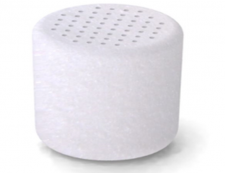Agili-C – P210034
This is a brief overview of information related to FDA’s approval to market this product. See the links below to the Summary of Safety and Effectiveness Data (SSED) and product labeling for more complete information on this product, its indications for use, and the basis for FDA’s approval.
Product Name: Agili-C
PMA Applicant: CartiHeal Ltd.
Address: 17 Atir Yeda Street, Kfar Saba, 4464313, Israel
Approval Date: March 29, 2021
Approval Letter: Approval order
What is it?
Agili-C is an implant designed to treat defects or lesions that occur in the cartilage around the bones of the knee joint. The implant is made from natural calcium carbonate found in the purified external skeleton of coral and is compatible with living tissue (biocompatible) and resorbs in the body over time (biodegradable).
How does it work?
In the knee joint, the doctor drills a hole in the bone below the defect or lesion in the cartilage and implants the Agili-C. Once implanted, the Agili-C allows the defects in the joint’s surface to fill in with new tissue. Over time, the Agili-C gradually breaks down (resorbs) and is replaced by new tissue.
When is it used?
The Agili‑C is intended for use where cartilage is missing or at the site of bone and cartilage (osteochondral) defects of the knee joint when that damage is caused by trauma or by arthritis in the knee (osteoarthritis). It is used for injuries to the surface of the knee joint that are considered grade 3 or above based on the International Cartilage Repair Society measurement.
What will it accomplish?
In a clinical study of 251 patients, patients who had open surgery to receive the Agili‑C implant reported a 21-point improvement in pain and function compared to patients who received the current standard of care arthroscopic procedures. The scores were based on a 100-point scale called the Knee Injury and Osteoarthritis Outcome Score that measures pain, other symptoms, quality of life, and activities of daily living and sports.
At 24 months, 88.5% of patients (138 out of 156) treated with open surgery and the Agili‑C had at least 75% of their cartilage defect filled with new tissue, compared to only 30.9% of patients (21 out of 68) in the control group who received the arthroscopic standard procedures.
When should it not be used?
The Agili-C should not be used in patients who have:
- Local or systemic bone or joint infection
- Arthritis caused by the joint’s nerves not working (neuropathic arthritis)
- Hypersensitivity, allergy, or intolerance to materials containing calcium carbonate or coral derivatives
- Inadequate blood supply to the limb (critical limb ischemia)
- Any tumor of the knee area
- Severe osteoarthritis in the joint that will receive the implant
- Inadequate bone quality or dimension
- Defects or lesions that are larger than what the implant can cover

